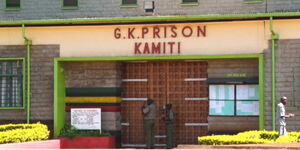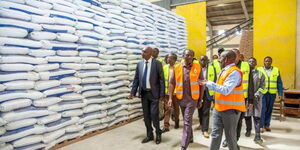Most Kenyans are embracing other homemade fertilizers such as organic biofertilizers alongside government’s subsidized chemical fertilizers.
High cost of fertilizers is a major concern among farmers in Kenya as it is one of the reasons why most food commodities were expensive.
Farmers who do not afford the high cost of fertilizer end up using inadequate quantities that lead to poor yields.
President William Ruto’s government announced fertiliser subsidy that saw the price of a 50-kilogram bag drop to Ksh3,500 from over Ksh6,000 to cushion farmers and lower the cost of food production.
As a result, biogas technology companies encouraged farmers to embrace use of organic biofertilizers, that are cheaper and readily available.
This requires that a livestock farmer uses a bio digester, which produces gas and the residue is utilized as organic fertilizer.
Waste from cattle, pigs, chicken are commonly used in the biogas digesters to produce methane gas and the residue applied on farms.
Establishing a bio digester costs between Ksh50,000 to above Ksh200,000 depending on the size that a farmer wants.
Though it appears expensive, most biogas companies usually allow farmers to pay in installments over a period of time as they continue using the product.
Biogas technology companies including Sistema.bio and Flexi biogas solutions agree on 10 reasons why farmers should use bio fertilizers to increase food production.
Apart from a farmer enriching the soil with organic biofertilizer, a bio digester produces cooking gas.
According to Sistema, farmers control livestock at a central point for easier collection of waste for use in bio digesters.
Users produce their own organic fertilizer, reducing over-dependence on chemical fertilizers, hence lowering the cost of production.
Bio digesters create farm resilience by allowing farmers to be self-reliant by making use of livestock wastes while also protecting the environment.
Another benefit is that, continued use of organic biofertilizers improves soil fertility by adding more nutrients in the soil.
Biogas technology companies recommend this type of fertilizers since it can be used in top-dressing together with irrigation water.
In addition, organic biofertilizers are natural and boosts crop health on farms naturally. The process of livestock wastes decomposition does not require any chemical intervention.
Organic fertilizers don’t interfere with the soil PH balance because they don’t discharge any foreign artificial compounds in the soil.
This type of fertilizers delivers nutrients in a slow and sustainable rate, hence suitable during heavy rains unlike other fertilizers that are easily washed away by rain water.
Apart from that, they are safe to handle while applying on the farm.
Once applied on the farm, it has a longer lasting effect on crops, as it also improves the soil structure by holding soil particles together.
It treats seeds for higher germination rates, better yields, improved coloration of fruits and vegetables, and tenderness of leafy vegetables.
When applied on farm, it creates favourable soil conditions for availability of nitrogen fixing organisms.
According to Sistema, this type of fertilizers requires a farmer to be patient in the continuous use of the same to achieve the best yields on a farm.












